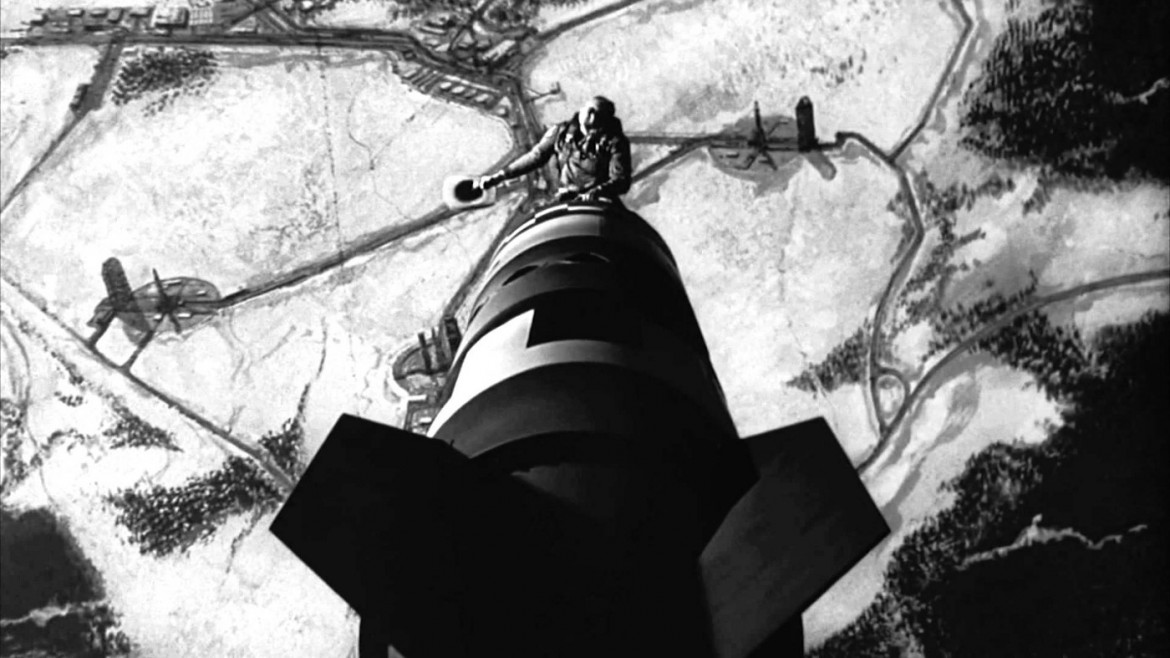Commentary
Strangelove is back – and it’s not a movie this time
Donald Trump’s belligerent proclamation was enough to provoke a restructuring of the European manufacturing economy. All with the stated goal of ‘doubling down.’

Remember Stanley Kubrick’s extraordinary, dystopian film Dr. Strangelove? It’s not an exaggeration to say we’re living in it. We are part of the script and setting of bright lights above European capitals and missile launching points. However, we are just actors, not the protagonists, and we can only fear that it will all end with the same tragicomic conclusion.
We’re talking about the militarist drift of the whole of Europe, which is now taking on a general pro-nuke character, with the unprecedented situation of Germany with Finance Minister Lindner, and now Poland’s military as well, musing about the concrete need for having a nuclear deterrent. France already has nuclear weapons, and so does the UK, now outside the Union.
It was enough for Donald Trump to reiterate his American-isolationist stance in the midst of the campaign for the U.S. presidential election, with his provocative statement that he would “encourage [Russia] to do whatever the hell they want” to any NATO country that doesn’t “pay the bills,” to cause an outburst of governmental reactions from the Old Continent, all ready to demonstrate that their countries were militarily able to fend for themselves, with an accompanying race for who has the most firepower. All with the stated goal of “doubling down”: that is, spending on both European defense as well as on the Atlantic Alliance.
In short, a move from welfare to warfare. Taking into account the fact that in the past 9 years, since 2014, the European states plus Canada have increased their military budgets by as much as €600 billion, and that in 2024 most NATO countries will commit at least 2% to defense (with “virtuous” countries like Poland already at almost 4% and Chancellor Scholz’s Germany already committing €100 billion to defense). Not to mention the EU’s decision to take funds even from the NRRP to supply weapons for the war in Ukraine.
Atlantic Alliance Secretary Stoltenberg was wonderfully adaptable as usual: he started by effectively agreeing with Trump (“the criticism … is not primarily about NATO, it’s about NATO allies not spending enough on NATO. And that’s a valid point”) and then declared proudly that “there is an enormous difference and the European Allies have really stepped up.” And it’s true: we are in fact already following Trump’s agenda – whether he is elected or not – as the European Union has already decided on as much as €41 billion in military aid to Ukraine precisely because it fears the isolationist tycoon’s advent to the U.S. presidency. Adding to the concern was the news, also from the U.S., that House Intelligence Committee Chairman Republican Mike Turner has asked president Joe Biden to make public “a serious threat to national security,” which, according to CNN and Reuters, refers to top secret Russian space-based nuclear weapons (further details unknown).
Turner’s public statement was probably a ploy to try to resolve the knotty issue of getting the needed bipartisan votes to send many tens of billions in new weaponry to Ukraine – Turner is part of the pro-Ukraine Republican front – but also evidence of what seems to be a real issue. Namely, that in this dynamic of precipitation towards war, it shows the plausible prospect that the nuclear deterrence of a nuclear power like Russia – while it publicly denies it – is evolving towards space-based nuclear warheads, beyond the “ordinary” land and naval ones. In short, from Reagan’s much-hyped space shield to Putin’s warheads in Earth’s orbit.
It goes without saying that this prospect is only more realistic when one takes into account the fact that there is an armed conflict in Europe pitting a country that has atomic bombs, Russia, against Ukraine, which doesn’t, and which still wants to join NATO (although the U.S. president has said no so far). The military alliance is involved in this war in an increasingly direct manner with intelligence and war supplies. But apart from NATO, Ukraine – as everyone tends to forget – is militarily dependent on the United States, which already has at least a hundred atomic bombs scattered all over Europe, from Italy to Belgium and Germany.
I am convinced that this is not the path: that, if peace and our future itself are under threat, due to the conditions of fierce trench warfare that is now also spilling over onto Russian soil, the only possibility is to rewind the tape of the 10 years of conflict – from Maidan 2014, Crimea, the civil war for the Donbass, and the two years since Putin’s aggression on February 24, 2022 – and find terms for negotiations, without seeking a “victory” for either Kyiv or Moscow, which is an impossible prospect, as these two years of bloodshed have shown. What’s the other option?
The other option is that the prospect of an atomic confrontation in Europe would become inevitable – an unequal one, with the thousands of operational Russian warheads compared to hundreds in France and the U.K. But at that point, with international treaties torn up – and we are well on the way there – why exclude the thousands of U.S. warheads joining in? Or, as an Israeli minister in the Netanyahu government floated, why even exclude the nuclear solution for the Palestinians in Gaza as well? At that point, it’s just what everybody else is doing.
And our European leaders seem to be telling us to “prepare for war,” as we come closer to the European elections. Will they be the Day After elections? Dr. Strangelove is back. And it’s no longer just a movie.
Originally published at https://ilmanifesto.it/stranamore-e-tornato-e-non-e-un-film on 2024-02-16
